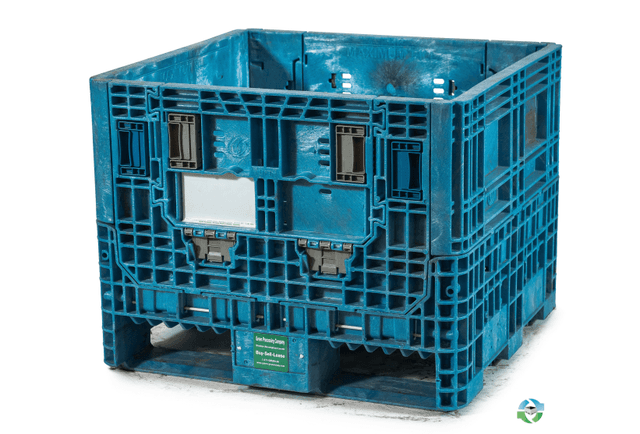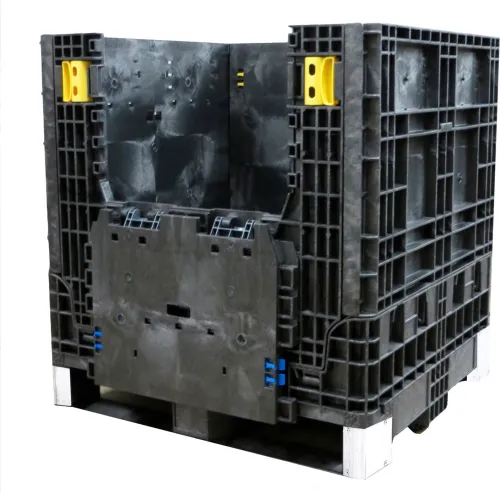Why used plastic containers are popular in food and manufacturing industries
The Ultimate Overview to Picking the Right Bulk Containers for Your Company Demands
Choosing the proper bulk containers is vital for any business that depends on efficient logistics. Numerous sorts of containers exist, each created for certain materials and applications. Aspects such as size, product compatibility, and governing requirements play a substantial function in this decision-making procedure. Understanding these components can lead to enhanced operational performance. Nonetheless, many businesses ignore vital aspects that can enhance their total performance and sustainability. What are these considerations?
Understanding Different Kinds of Bulk Containers
Bulk containers function as necessary devices for businesses looking for reliable storage space and transportation options. These containers come in various kinds, each designed to fulfill specific functional demands. One typical kind is the intermediate bulk container (IBC), which is suitable for fluid and granulated materials, using a balance of capability and ability to move. An additional preferred alternative is the bulk bag, or FIBC, appropriate for completely dry, flowable items. These adaptable containers are light-weight and can be conveniently moved and stored. For larger materials, stiff mass containers are typically used, giving longevity and security for risk-free handling. Additionally, there are specific containers tailored for harmful products, ensuring compliance with safety and security laws. Recognizing the unique qualities of these bulk container kinds allows services to make informed choices that enhance logistics and minimize costs. By picking the ideal container, firms can enhance their operational efficiency and streamline their supply chain processes.
Secret Product Considerations for Mass Containers
When picking mass containers, it is vital to ponder the materials utilized in their building. Factors such as chemical, durability, and toughness compatibility play an important role in making sure the containers meet specific functional demands. In addition, weight and transportability issues can impact both efficiency and transportation logistics.
Material Resilience and Strength
Resilience and toughness are crucial elements in picking materials for mass containers, as they straight influence the container's ability to withstand numerous ecological conditions and dealing with procedures. Materials such as high-density polyethylene (HDPE), polypropylene, and stainless-steel are generally preferred for their durable residential properties, providing resistance to influence, abrasion, and temperature variations. The option of product also affects the general life-span of the container; more powerful products typically lead to much less constant substitutes, causing cost savings in time. In addition, the weight of the product can impact shipping prices and convenience of handling. Companies should consider their specific functional settings and the potential for wear and tear to guarantee peak longevity and toughness in their mass container choice.
Chemical Compatibility Variables
Comprehending chemical compatibility is vital for choosing bulk containers, as the materials made use of must stand up to the specific substances they will hold. Different variables influence compatibility, including the chemical nature of the contents, temperature, and period of storage space. Harsh chemicals may call for containers made from stainless steel or specialized plastics that withstand deterioration. Furthermore, responsive materials can produce heat or gases, necessitating vented or pressure-rated containers. The option of container material, whether polyethylene, metal, or polycarbonate, ought to straighten with the chemical residential properties of the stored compounds to protect against leakages or violations. Eventually, a comprehensive examination of these compatibility aspects ensures safe handling and storage space, securing both personnel and the atmosphere while maintaining item honesty.
Weight and Portability Issues
Picking mass containers entails not only evaluating chemical compatibility however likewise thinking about weight and mobility. Organizations must evaluate the ease of handling and transportation to optimize performance. Light-weight materials like high-density polyethylene (HDPE) or aluminum can help with easier movement and reduce delivery expenses. Conversely, heavier containers might provide boosted sturdiness yet can impede flexibility, especially in atmospheres requiring regular moving. Furthermore, the layout of the container ought to enable for convenient lifting and piling, making sure ergonomic safety and security for workers. Firms must additionally consider the facilities offered for transport; as an example, containers compatible with forklifts or pallet jacks can enhance operations. Ultimately, the best equilibrium in between weight and portability straight influences operational efficiency and cost effectiveness.
Sizing Your Bulk Containers for Optimum Effectiveness
When sizing mass containers, companies need to thoroughly assess the measurements required to suit their details products. Furthermore, weight capacity is a crucial aspect that affects efficiency and safety throughout transport and storage. Effective sizing not only takes full advantage of area however likewise enhances operational operations.
Determining Container Dimensions
Choosing the appropriate measurements for bulk containers is crucial for taking full advantage of effectiveness in storage and transportation. Companies have to examine their details demands, taking into consideration elements such as offered room, the nature of the goods being saved, and the techniques of transportation made use of. Accurate dimensions guarantee that containers fit preferably in vehicles and storage facilities, minimizing squandered space and decreasing handling time. Standard sizes can supply benefit, but customized measurements could be necessary for special requirements or to suit details products. In addition, it is necessary to evaluate stacking capabilities and accessibility, as these aspects influence total functional performance. Eventually, the right dimensions bring about improved organization and structured logistics, profiting the total productivity of the organization.
Weight Capacity Considerations
Recognizing weight capacity is crucial for companies intending to maximize their bulk container efficiency. The weight ability of a container directly affects storage space capabilities, transport logistics, and total functional costs. Choosing containers with the proper weight limits ensures that businesses can safely keep and transport their goods without risking damage or compliance problems. Overwhelming containers can cause architectural failings, while underutilizing ability outcomes in thrown away resources. When choosing containers, it is essential for services to assess their product weights and consider any type of regulatory needs. In addition, factors such as the kind of product, meant usage, and ecological problems must likewise influence weight capacity choices. By evaluating these aspects, companies can enhance efficiency and guarantee a streamlined supply chain.
Regulatory Compliance and Security Specifications

Regulatory conformity and security standards play an important function in the option of bulk containers for companies. Organizations must ensure that their containers meet different policies established by neighborhood, national, and worldwide authorities. These standards typically concern material safety and security, structural integrity, and appropriate labeling, which help protect against accidents and guarantee the secure transport of products.
Additionally, adherence to industry-specific guidelines, such as those from the Fda (FDA) or the Occupational Safety and Health And Wellness Management (OSHA), is critical for business handling unsafe products or foodstuff. Non-compliance can result in penalties, legal issues, or damages to a business's track record.
Organizations must additionally think about the container's compatibility with the products being kept or transferred to prevent contamination or chain reaction (refurbished bulk containers). To sum up, recognizing and executing regulatory compliance and security requirements is vital for the liable and reliable use mass containers
Sustainability Alternatives for Eco-Friendly Mass Containers

Business are also checking out alternatives made from recycled products, which not only conserve resources however likewise sustain the reusing sector. Furthermore, advancements in design enable lighter containers that need less energy to transport, better improving sustainability. By integrating these eco-friendly bulk container choices, services can demonstrate their dedication to ecological stewardship while meeting customer demand for sustainable methods. This shift not just helps the planet however can likewise boost brand name online reputation and customer commitment.
Cost-Effectiveness and Budgeting for Mass Containers
While many organizations concentrate on sustainability, cost-effectiveness continues to be a critical aspect when selecting mass containers. Organizations has to assess the preliminary purchase price, in addition to lasting functional costs, to ensure monetary viability. Elements such as toughness, upkeep, and reusability play a considerable duty in try this website determining overall expenses.
Spending in high-grade containers may generate higher upfront costs but can cause savings through lowered replacement prices and lowered waste. In addition, companies should think about transportation costs and storage effectiveness, as these can influence the overall spending plan.

Often Asked Inquiries
Exactly how Do I Figure Out the Right Container for Hazardous Materials?
To establish the appropriate container for dangerous materials, one need to review compatibility with the compound, think about the container's material, check for regulatory compliance, and examine capacity and safety features to ensure proper handling and storage.
Can Mass Containers Be Custom-made for Specific Products?
Yes, bulk containers can be customized for certain products. used collapsible containers. Numerous features, such as layout, size, and product, can be tailored to meet distinct needs, making sure excellent security and efficiency for carrying and saving various items
What Is the Average Life-span of Various Mass Container Types?
The ordinary life expectancy of mass container types varies; plastic containers last 5-10 years, metal containers 10-20 years, and wooden containers generally last 3-7 years, depending upon use, maintenance, and environmental problems.
How Should I Clean and Maintain Bulk Containers?
To clean and keep bulk containers, one need to on a regular basis evaluate for damage, eliminate deposit, clean with suitable detergents, rinse extensively, and warranty correct drying prior to storage. Adhering to supplier standards boosts durability and safety throughout use.
Exist Rental Choices for Mass Containers Available?
Yes, numerous companies supply rental choices for bulk containers, giving have a peek at this website versatility for services. These leasings can accommodate different needs, enabling companies to take care of stock successfully without the dedication of acquiring containers outright.
Longevity and toughness are vital aspects in selecting products for bulk containers, as they directly influence the container's capacity to stand up to different environmental conditions and handling processes. Recognizing chemical compatibility is essential for selecting mass containers, as the products used have to resist the specific compounds they will certainly hold. Comprehending weight capability is important for businesses intending to enhance their bulk container effectiveness. Governing compliance and safety standards play a vital function in the choice of bulk containers for companies. While many companies focus on sustainability, cost-effectiveness remains a vital element when picking bulk containers.